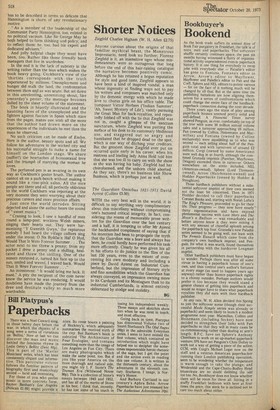Shorter Notices
Ziegfeld Charles Higham (W. H. Allen £2.75)
Anyone curious about the origins of that familiar mythical beast, the Monstrous lmpressario, need look no further; Florenz Ziegfeld is it, an insensitive ogre whose misdemeanours were so outrageous that long before the end of this hair-raising catalogue the narrative becomes positively comic. Although he has retained a bogus reputation for style and good taste, Ziegfeld appears to have been a kind of inspired vandal, a man whose ingenuity at finding ways not to pay his writers and composers was matched only by the demonic energy with which he made love to chorus girls on his office table. The composer Victor Herbert ('Indian Summer', 'Ah, Sweet Mystery of Life'), vainly pursuing the Great Man for back-royalties, and repeatedly fobbed off with the lie that Ziegfeld was not in, caught a glimpse of the sanctum sanctorum, where Ziegfeld was putting the surface of his desk to its customary libidinous use, and staggered out so angry and humiliated that he dropped dead on the spot, which is one way of ditching your creditors. But the greatest show Ziegfeld ever put on occurred quite early in his career, when his mistress and leading lady Anna Held told him that she was too ill to carry on with the show as she was having his baby. Ziegfeld had her choroformed, and the unborn child aborted. As they say, there's no business like Show Business, which is perhaps just as well.
The Guardian Omnibus 1821-1971 David Ayerst (Collins £5.50).
WITH the very best will in the world, it is difficult to say anything very complimentary about this miscellany without compromising one's battered critical integrity. In fact, considering the reams of memorable prose written for the Guardian over the last century • and a half, it is tempting to offer Mr Ayerst the backhanded compliment of saying that if his intention had been to propogate the myth that the Guardian was a bore and always has been, he could hardly have performed his task more efficiently. Clearly he was given his all in his efforts to do justice to the files of the last 150 years, even to the extent of overcoming his own modesty and including a piece by David Ayerst on Industrial Cumberland, but the impression of literary style and fine sensibilities which the Guardian has always conveyed, an impression owning more to its Carduses and its Montagues than to its industrial Cumberlands, is almost entirely obliterated by stodge and stolidity.
HG.


































































 Previous page
Previous page